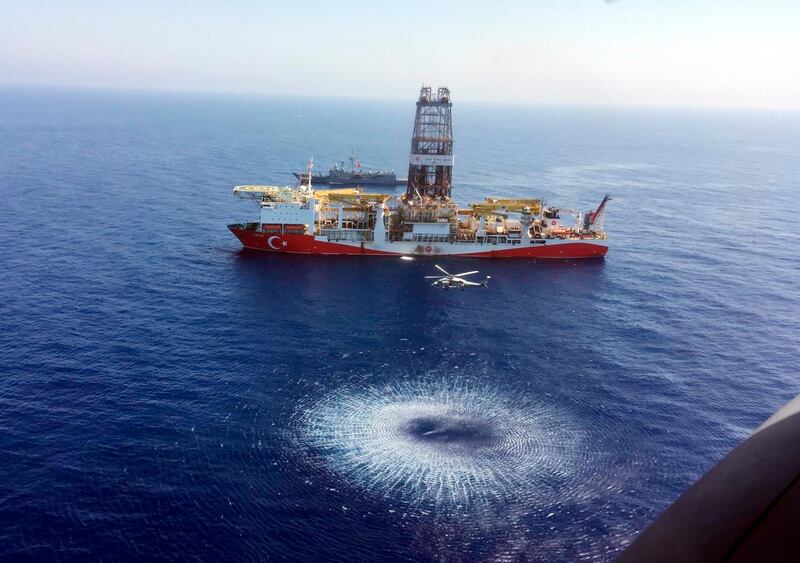Steadily and with little international attention, tension has been rising in the east Mediterranean over exploitation of the region's natural gas as Turkey squares up to Egypt, Greece, Cyprus and Israel in a potentially dangerous standoff over the potential riches.
What is at stake cannot be overestimated; the US Geological Survey estimates natural gas reserves in the region to be up to 223 trillion cubic meters. This is enough to turn the area into one of the world’s major sources of gas for decades, giving producing countries a major economic boost.
The discoveries, spanning from Israel’s Tamar field in 2009 to Cyprus’ Glaucus-1 in February this year, have been complemented by multi-billion-dollar deals to turn gas from these and other Cypriot and Israeli fields to liquid at facilities in Egypt, whose own gas field, Zohr, is the largest in the Mediterranean.
Plans are also underway to build a pipeline involving Israel, Greece and Cyprus, a positive step toward the planned creation of a "regional gas hub" with Egypt.
Raising the stakes even higher, Europe is due to be the primary market for the gas, thereby reducing its dependence on Russia.
Belligerently, NATO-member Turkey has dispatched its own vessels to drill for gas in the Mediterranean off the coast of Cyprus, an island that Ankara divided along ethnic lines when it invaded it in 1974, ostensibly to protect the Turkish minority there.
Ankara's decision to drill inside Cyprus' Exclusive Economic Zone, or EEZ, drew an angry response from the United States and European Union, of which the internationally-recognised government in the Greek part of Cyprus is a member. Responding to diplomatic pressure by Cyprus and Greece, the EU last month slapped sanctions on Turkey, reducing financial assistance and halting high-level talks.
Egypt, a key member in an emerging gas trading bloc grouping Israel, Greece and Cyprus, denounced the Turkish move and warned Ankara against unilateral moves that could raise tension in the region.
Turkish exploration and the response it has drawn have deepened the distrust and rivalry that have defined relations between Turkey on the one hand and Israel, Egypt, Cyprus and Greece on the other.
While the chances of war over the issue are low, sabre rattling and even limited military standoffs, cannot be ruled out.
"I don't think that the gas standoff in the east Mediterranean will lead to an armed conflict. Turkey is not looking for that," said Charlie Charalambous, editor-in-chief of the Cypriot weekly Financial Mirror and a longtime expert on the island's politics.
"Turkey's message is that it is a geopolitical player that counts and that others in the region cannot do anything without it.”
Just how Turkey could fit in to this emerging trading grouping is unclear, especially given its argument for a seat on the table is primarily based on what it sees as the rights of the Turkish Cypriots, whose state is recognised only by Ankara.
“The fact that so many parties are involved further complicates the problem,” Cairo University political science lecturer Hassan Nafaa said in a recent television interview.
“That Turkey has a problem with every one of them does not help either. Resolving the political problems between them and Turkey is the only way toward an agreement for sharing the gas.”
It's a tall order.
Egypt, whose Zohr gas field came online in December 2017, has been at sharp odds with Turkey over what Cairo sees as Ankara’s support for Islamic extremist groups.
To the Greek Cypriot government, Turkey is a foreign occupier that is preventing the reunion of the island despite seemingly endless rounds of negotiations between representatives of the majority Greek community and the Turkish minority.
Enmity between Greece and Turkey is rooted in the brutal, centuries-long Ottoman rule over Greece. The two neighbours and fellow NATO members are now at loggerheads chiefly over territorial disputes in the Aegean Sea.
Israel and Turkey have not shared overtly positive relations since Israeli troops boarded a flotilla of Turkish vessels attempting to break the Israeli siege of Gaza to deliver aid supplies in 2010. The Israeli soldiers killed nine activists on board.
Barring unforeseen developments, none of these animosities or rivalries are expected to spill over into armed conflict.







